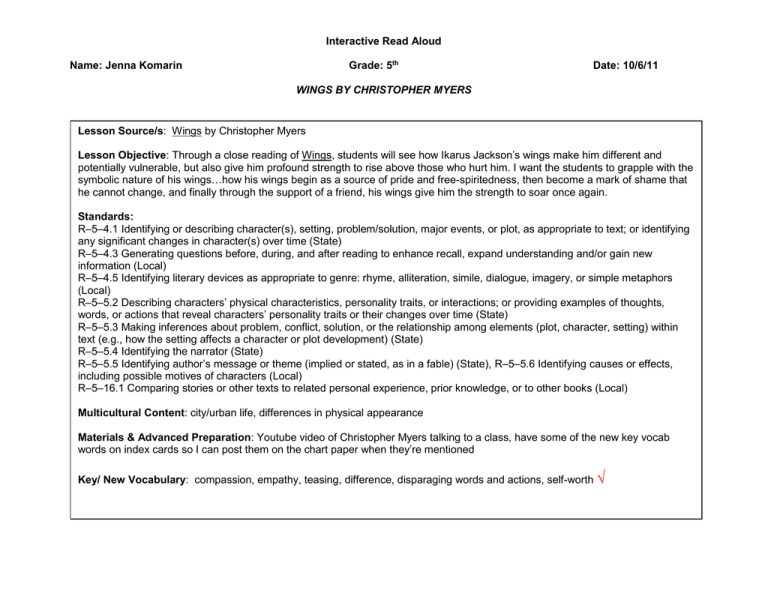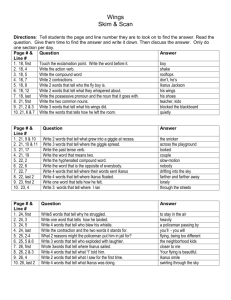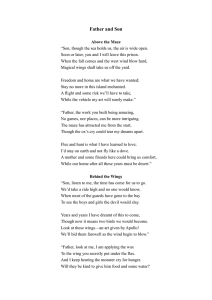Interactive Read Aloud Name: Jenna Komarin Grade: 5
advertisement

Interactive Read Aloud Grade: 5th Name: Jenna Komarin Date: 10/6/11 WINGS BY CHRISTOPHER MYERS Lesson Source/s: Wings by Christopher Myers Lesson Objective: Through a close reading of Wings, students will see how Ikarus Jackson’s wings make him different and potentially vulnerable, but also give him profound strength to rise above those who hurt him. I want the students to grapple with the symbolic nature of his wings…how his wings begin as a source of pride and free-spiritedness, then become a mark of shame that he cannot change, and finally through the support of a friend, his wings give him the strength to soar once again. Standards: R–5–4.1 Identifying or describing character(s), setting, problem/solution, major events, or plot, as appropriate to text; or identifying any significant changes in character(s) over time (State) R–5–4.3 Generating questions before, during, and after reading to enhance recall, expand understanding and/or gain new information (Local) R–5–4.5 Identifying literary devices as appropriate to genre: rhyme, alliteration, simile, dialogue, imagery, or simple metaphors (Local) R–5–5.2 Describing characters’ physical characteristics, personality traits, or interactions; or providing examples of thoughts, words, or actions that reveal characters’ personality traits or their changes over time (State) R–5–5.3 Making inferences about problem, conflict, solution, or the relationship among elements (plot, character, setting) within text (e.g., how the setting affects a character or plot development) (State) R–5–5.4 Identifying the narrator (State) R–5–5.5 Identifying author’s message or theme (implied or stated, as in a fable) (State), R–5–5.6 Identifying causes or effects, including possible motives of characters (Local) R–5–16.1 Comparing stories or other texts to related personal experience, prior knowledge, or to other books (Local) Multicultural Content: city/urban life, differences in physical appearance Materials & Advanced Preparation: Youtube video of Christopher Myers talking to a class, have some of the new key vocab words on index cards so I can post them on the chart paper when they’re mentioned Key/ New Vocabulary: compassion, empathy, teasing, difference, disparaging words and actions, self-worth Lesson Procedure Time 5 minutes Teacher Actions Student Learning Activities 1. Connection Make sure students are sitting calmly and doing active listening. In a moment we’re going to read Wings by Christopher Myers. It’s about a boy named Ikarus Jackson who is teased by schoolmates because he is different. Before we begin, I want to show you a few minutes of a video so you can see and hear the author Christopher Myers and get a sense for the kind of writer he is. As you’re watching, try to think about what his purpose might be for writing this book. 18 minutes Form of Assessment 2. The Read Aloud Before I begin reading: based on what you know so far, what do you think the author’s purpose in writing this book might be? BEGIN READING: Look at that strange boy! Everyone from the neighborhood is pointing fingers and watching the sky. How’s he doing that? They stretch their necks and shake their heads. Ikarus Jackson, a new boy on my block, is flying above rooftops. He is swooping and diving, looping past people’s windows and over the crowd. I don’t think he’s strange. Q: How does this first page introduce the setting? Who is the narrator? What impression do you get about Ikarus Jackson’s character based on the narrator’s description? Ikarus Jackson, the fly boy, came to my school last Thursday. His long, strong, proud wings followed wherever he went. Q: The fly boy—how is the author using these words to have more than one meaning? What impression do you get so far about the narrator? I will stop a lot to ask questions about the text as it relates to the big idea of the book. The whole school was staring eyes and wagging tongues. They whispered about his wings and his hair and his shoes. Like they whisper about how quiet I am. Q: When the author writes, “the whole school was staring eyes and wagging tongues” what does that mean? What expectations do you have for the way the narrator will relate to the teasing of Ikarus? Do you think she will empathize with him and why or why not? Our teacher complained that the other kids couldn’t help but gawk and stare. He said that Ikarus’s wings blocked the blackboard and made it hard for the students to pay attention. The teacher told Ikarus to leave class until he could figure out what to do with his wings. He left the room quietly, dragging his feathers behind him. One boy snickered. Q: What does this tell us about the teacher? Why isn’t the teacher helping Ikarus? At recess the snicker grew into a giggle and spread across the playground. Soon all the kids were laughing at Ikarus Jackson’s “useless” wings. I thought that if he just flew once everyone would stop laughing. Ikarus looked up, flapped his wings a couple of times, then jumped into the air. Q: The students and teacher are acting in a disparaging way toward Ikarus. To be disparaging is to be really cruel and make someone feel worthless. The narrator is really upset by this. Do you agree with her idea that flying will show everyone that his wings are not uselss? Why or why not? [Turn and Talk] He swept through the schoolyard like a slow-motion instant replay. But other kids were not impressed. One girl grabbed the basketball. A boy stuffed the handball in his pocket. Somebody nagged, “Nobody like a show-off.” Q: What’s going on here? Are you surprised? Why or why not? Their words sent Ikarus drifting into the sky, away from the glaring eyes and the pointing fingers. I waited for them to point back at me as I watched Ikarus float farther and farther away. Q: What is the narrator suggesting when she says, “I waited for them to point back at me”? Walking home from school, I knew how he felt, how lonely he must be. Maybe I should have said something to those mean kids. Q: What does this tell you about the narrator? I ran through the streets with my eyes to the sky, searching the clouds for Ikarus. He struggled to stay in the air. His wings drooped and his head hung low. He landed heavily on the edge of a building and sat with the pigeons. Pigeons don’t make fun of people. Q: What do you make of this statement? A policeman passing by blew his whistle. You with the wings, come down from there! Stay yourself on the ground. You’ll get in trouble, you’ll get hurt.” Q: What do you think of the policeman’s words and actions? It seemed to me Ikarus was already in trouble and hurt. Could the policeman put him in jail for flying, for being too different? When the neighborhood kids saw the policeman yelling at him, they exploded with laughter. Ikarus dropped to the ground. “Stop!” I cried. “Leave him alone.” And they did. Q: What motivates the narrator to take a stand against the neighborhood kids now? I called to Ikarus and he sailed closer to me. I told him what someone should have long ago: “Your flying is beautiful.” Q: What else is she really saying to him here? For the first time, I saw Ikarus smile. At that moment I forgot about the kids who had laughed at him and me. I was just glad that Ikarus had found his wings again. “Look at that amazing boy!” I called to all the people on the street as I pointed to my new friend Ikarus swirling through the sky. Q: How does the narrator change and grow alongside Ikarus from the beginning of the book to the end? What’s the lesson that we can learn from Ikarus? 3 minutes 3. Turn and Talk Q: We never got to hear from Ikarus in his own words…if he could say something to us now, how do you think he would describe his experience as a new student in this school, and what might his advice be to other kids who have been teased or disparaged by others? [Turn and Talk] Anticipated Responses/Outcomes 1 minute 4. Closing and Recording You can see just how much disparaging words and actions can hurt someone’s feelings…as you go throughout your you’re your week, and your year, I want you to think about the ways that your words and actions might affect other people. And if you’re ever feeling bad about yourself, just remember Ikarus and his wings. The things that make us different also make us strong. Anticipated Responses/Outcomes 5. Follow Up What will students do to practice what they learned during the read aloud? What mini-lesson might be developed from this reading? Maureen: This section always confuses me…should I come up with an idea for a follow up lesson? This is really meant to address instructional elements (more than responses) and so it doesn’t really fit with this lesson. One of the challenges with this text is the narrator “voice” versus Ikarus. The narrator is telling us about Ikarus, but we are also learning a lot about her. If your objective was tied to character traits, or motivation, etc….then you might follow up with asking kids to pay attention to characters in their books, etc…. Reflections: HOW DID THE LESSON PLAN WORK? W HAT WAS EFFECTIVE? W HAT DID YOU LEARN? W HAT WOULD YOU CHANGE FOR TOMORROW OR THE NEXT TIME YOU WILL USE THIS PLAN? How are students going to review/practice what they learned during the read aloud? How will you assess the application of the strategy or comprehension of the key element you wanted to demonstrate using the text?



